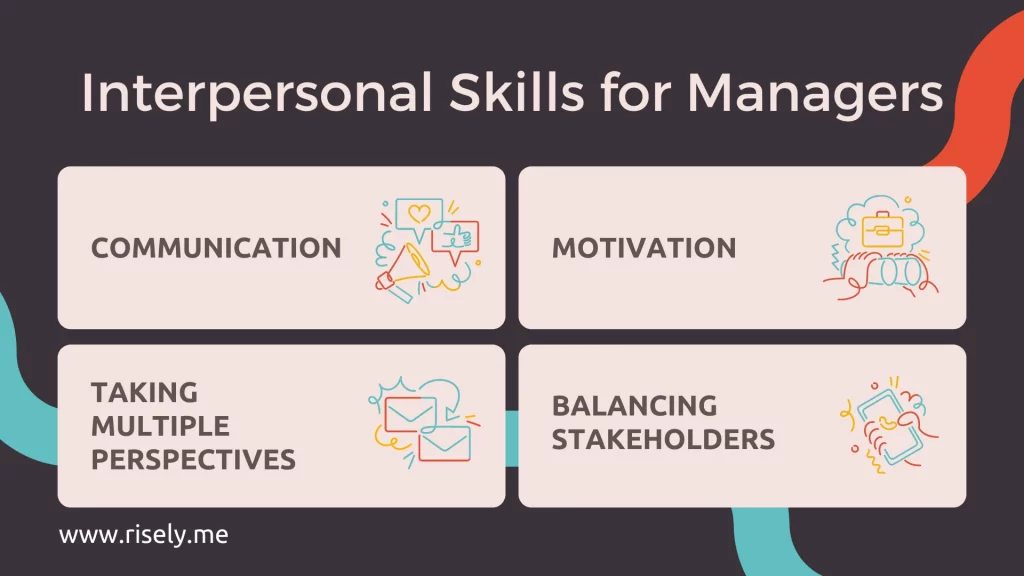The Top 4 Interpersonal Skills Of A Manager To Win Big
In today’s cutthroat business world, what separates a good manager from a great one? The answer lies in a secret weapon: interpersonal skills. These aren’t just fancy social graces – they’re the superpowers that allow you to navigate complex situations, motivate your team, and ultimately, lead them to success. Imagine yourself scaling a mountain with your team – you need trust, clear communication, and the ability to navigate challenges together. That’s the power of interpersonal skills in action. Intrigued? Then keep reading, because we’re about to delve into the four essential interpersonal skills that will transform you from a boss who gives orders to a leader who inspires action. We’ll explore what these skills are, why they matter, and equip you with practical tips to master them. So, lace up your metaphorical hiking boots and get ready to conquer the peak of managerial excellence! Let’s dive in!What do Interpersonal Skills Mean?
Interpersonal skills are the skills that allow you to interact with others effectively. They include communication, problem-solving, and teamwork skills. You need interpersonal skills to get along with other people, both in your personal and professional life. In a nutshell, interpersonal skills can be defined as:- the ability to read others, understand them and respond appropriately
- being able to create rapport quickly with the people you want and need to work with
- developing the skills, enthusiasm, and confidence to deal effectively with all internal and external stakeholders
Types of Interpersonal Skills
Interpersonal skills for managers can be categorized into two types, namely: the physical and the social.Physical Interpersonal Skills
Physical interpersonal skills of a manager are all about body language in conversations. For example, when a manager is under pressure and stress at work, they must immediately find ways out of trouble rather than taking it personally and allowing their anger to acting up. Physical interpersonal interaction manifests through communication behavior such as eye contact while speaking, posture while speaking, emphasis on certain words, etc. Improper use of physical behavior can give the impression that the manager is not a good listener.Social Interpersonal Skills
To bring harmony among different people inside a team, it’s necessary for the managers and subordinates to understand each other’s personality types and points of view. You must know that some people may need more physical interaction than others, so they can adapt themselves to the particular personality type. The most obvious and basic requirement that a manager must have is to be sensitive to the moods of their people. It means managing them by following their “Highs” & “Lows”. Read more: Social Intelligence: Building Strong Workplace Relationships as a LeaderWhat is the Importance of Interpersonal Skills for Managers?
Good interpersonal skills of a manager are important to effectively manage teams because these skills help build trust, open communication, and cooperation. When team members trust their managers, they are more likely to be open and honest with them. This can help you identify potential problems and address them before they become bigger issues. In addition, when team members cooperate, they can work more effectively and efficiently towards common goals. To be specific about the outcomes, the interpersonal skills of a manager can help them:- Understand their team members
- Deal with the team members with empathy
- Develop the right people skills, technical skills, and soft skills necessary for their role
- Practice conflict management constructively
- Communicate effectively with their team members in both written and verbal communication
- Provide helpful feedback in the form of constructive criticism that is both meaningful and helpful
- Empower their team members to be creative and productive
- Build a team that is productive, cohesive, and motivated
Top 4 Interpersonal Skills for Managers

Communication
Communication skills refer to the ability to effectively exchange information with another person. It includes both verbal and nonverbal communication. Verbal communication involves speaking and listening. The speaker must be able to communicate their ideas clearly and effectively, while the listener must be able to understand what is being said. Verbal communication can be further divided into two categories: oral and written. Oral communication is face-to-face, while written communication is done through text or email. Nonverbal communication includes body language, facial expressions, eye contact, and gestures. Good nonverbal communication is important to a successful conversation because it often goes unseen by both parties. A manager with communication skills:- Communicates goals and expectations clearly
- Gives full clarity of tasks while keeping the details simple and concise
- Is able to build rapport with the team members
- Allows for open debate and feedback
- Easily facilitates communication within teams
- Is good in active listening skills and communicating new ideas
Motivation
Motivational skills refer to the ability to inspire oneself and others to achieve a goal. It is a psychological process that gives purpose and direction to behavior. Good motivational skills allow us to achieve our goals and aspirations. They also help us to maintain a positive attitude despite any obstacles or setbacks we may face. A manager with good motivational skills:- Identifies when the team morale may be down
- Preempts situations when team morale could below
- Encourages team from time to time to pick up morale where it has dropped
- Is able to give feedback in a way that preserves team morale
- uses emotional intelligence to keep employees and themselves motivated
Taking multiple perspectives
As a manager, it’s important to be able to take different perspectives into account when making decisions. This means being able to see things from your employees’ points of view, as well as from a higher level, looking at the big picture. It’s also important to be able to switch between these perspectives as needed to make the best decisions for your company. Managing diverse perspectives at work is especially important when you’re dealing with difficult or sensitive situations. It can help you find a resolution that works for everyone involved. You may also find that taking different perspectives helps you come up with better ideas and solutions to problems than other options. It also helps managers to display compassion and is a good step toward building trust. A manager who takes multiple perspectives:- Takes suggestions before sharing their opinions on the matter
- Paraphrases what their employees are saying to verify if they understood them correctly
- Encourages employees to come to them if they have any doubts about the decisions taken
- Shares their side of the story even if it may not agree with what he or she previously thought
Balancing stakeholders
When managing a business, it is important to remember to balance the interests of all stakeholders. This includes not just higher-ups and employees but also customers, suppliers, and the community in which the business operates. Balancing the interests of different stakeholders can be difficult, but it is important to make sure that all voices are heard and that the business is acting in a way that is fair and responsible. Often, this means making tough decisions that may not be popular with everyone. A manager who knows how to balance stakeholders:- Is cooperative and tries to keep everyone on board
- Keeps the team’s interest in mind while managing internal and external stakeholders
- Knows the subtle art of pushing back and being assertive at work
- Allows everyone to voice their opinions carefully, respectfully, and objectively
- Is a good negotiator as well as a good manager.
Other Interesting Reads
How to Develop Interpersonal Skills of a Manager? 6 Easy Tips
All the discussions above show that by developing interpersonal skills, one can become a more effective manager. But the question remains – how to develop the interpersonal skills of a manager? We have 6 simple tips for the same.Listen attentively
The ability to listen attentively is a critical interpersonal skill of a manager. But it is the one that is often overlooked. When we listen attentively, we demonstrate that we care about the person we are talking to and are interested in what they have to say. It makes the other person feel valued and respected and can help build strong relationships. There are a few things that you can do to improve your ability to listen actively:- First, make sure you are not distracted by other things around you when you are in a conversation with your team members.
- Secondly, try to refrain from judging or interrupting the person who is speaking. It shows your impatience with the discussion. As a result, the other person will think you are not taking the conversation seriously.
- Finally, pay attention to everything the person is saying—don’t skip ahead to what you think they will say next. Assuming the other person’s words or thoughts can be disrespectful.
Respect others and their opinions, even if you do not agree with them
When it comes to interpersonal skills for managers, respect is vital. It’s the backbone of any healthy relationship. Disrespect in a work environment can quickly make the culture toxic. Hence, respectful communication is essential in any team and can differentiate between a good and bad work environment. It’s crucial for managers to remember that everyone has different opinions and backgrounds. Managers must learn to handle differing opinions and viewpoints. As a manager, you must always take the time to listen to others, even if you disagree with them. This will help you to understand their perspective better and maybe even learn something new. Moreover, be respectful when dismissing someone’s viewpoint or presenting your counter. Read more: Assertiveness vs. Aggressiveness: How to be an effective leader?Ask questions to gain a better understanding of what the other person is saying
One of the ways to develop effective interpersonal skills, you must learn to ask probing questions. Questions show that you are interested in the other person and care about them. Asking questions also helps you go deeper into the discussion and learn more about what the other person is trying to say. As a result, you develop a deeper bond with the individual. Also, asking the right clarifying questions can eliminate misunderstandings or misinterpretations. When discussing a personal or professional topic, refrain from asking close-ended questions. A close-ended question stifles the discussion quickly. Instead, focus on open-ended questions. Open-ended questions allow the other person to explain what’s on their mind. Here’s something to help you out: 20 Active listening questions for Effective ManagersExpress your feelings calmly and respectfully
The interpersonal skills of a manager also involve being able to express your feelings calmly and respectfully to the people you work with. This ability becomes even more crucial in situations when emotions are running high. Situations with charged emotions expose an individual’s true self to others. Maintaining composure in such cases makes your team believe you are in control, which builds their confidence in your ability to lead them. If you can do this as a manager, you will create an environment where people feel safe and comfortable communicating with you. This, in turn, will allow you to build better relationships with your team and get more out of them. It also helps to resolve conflicts quickly and effectively.Opt for manager coaching
You might find yourself in situations that need deeper intervention to build your interpersonal skills. In these situations, self-help may not be enough. Effective interpersonal skills can be learned and improved with the help of manager coaching. Coaching can help you improve your interpersonal skills by focused guidance and feedback on the mistakes you might be making. To strategically build these skills, you will have to measure and gauge your progress. With proper measurement and guidance, coaching will also help you develop a plan of action that will make it easier for you to build effective relationships with others and ultimately develop interpersonal skills. Coaching and training for skill development can work in many ways; you can choose from:- mentorship from a senior in your organization who understands your context and helps you out
- one-on-one coaching from a professional to overcome your specific challenges
- workshops and seminars focused on particular skills
- an innovative AI-led approach to coaching by Risely, where Merlin, the AI coach, helps you out through challenges
Take time for reflection after each interaction
When you are interacting with someone, take a step back and think about how you felt during and after the interaction. What were your emotions? How was your tone of voice? What were your facial expressions? How was the other person reacting? After taking some time for reflection, write down what you could have done differently to make the interaction more positive for both of you. When you can identify areas for improvement, you can start to work on them and become more effective by developing the right interpersonal skills for a manager. Need some help? Read more about growth mindset here: 12 Ways to Build a Growth Mindset and Succeed in Your CareerConclusion
Ditch the “easy road” mentality! Mastering interpersonal skills isn’t about shortcuts; it’s about investing in the future of your team. Think of yourself as a sculptor, molding a high-performing team from the raw talent of your employees. With honed interpersonal skills, you can chip away at misunderstandings, build bridges of trust, and inspire your team to reach their full potential. The result? A motivated, collaborative team that tackles challenges head-on and celebrates successes together. So, embrace the journey of developing your interpersonal skills. Remember, it’s not about being perfect; it’s about showing your team you care, value their contributions, and are committed to their growth. By leading with empathy, clear communication, and a collaborative spirit, you’ll be well on your way to becoming a manager who inspires excellence. Now go forth and lead with purpose!Strengthen your interpersonal skills by practicing active listening.
Download the free active listening toolkit – an extensive guide for managers to develop a critical skill.
Other Related Blogs
Executive Communication Coach: When And How To Choose
Executive Communication Coach: When And How To Choose Good communication is a must for professional success. After all, half of people management is all about saying the right things in…
5 Unique Benefits Of Online Leadership Coaching
5 Unique Benefits Of Online Leadership Coaching Remember the days of leadership development being confined to a stuffy conference room filled with flipcharts and generic advice? Yeah, those days are…
Performance Management Training: Empowering Managers To Manage Better
Performance Management Training: Empowering Managers To Manage Better Remember that feeling of dread when you knew performance review season was rolling around? Yeah, us, too. For many employees, performance reviews…
Manager Development Goals And How To Reach Them: Opportunities And Areas To Focus On
Manager Development Goals And How To Reach Them: Opportunities And Areas To Focus On You’ve meticulously crafted a development program for your high-potential employees, but their managers just aren’t on…


